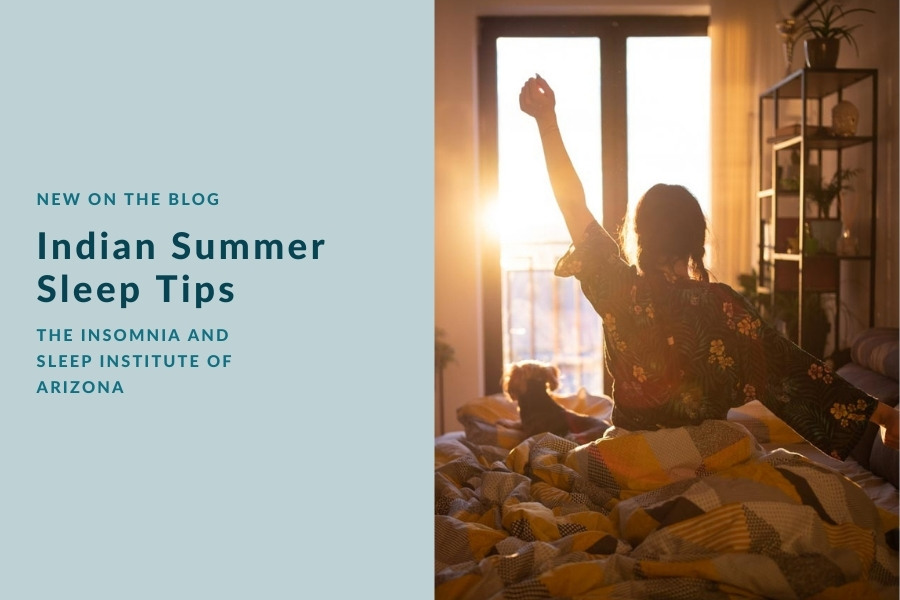Summer never truly comes to an end in Arizona, which means the heat alone can be enough to cause insomnia year-round. The Insomnia and Sleep Institute of Arizona is your source for treating and managing all sleep disorders, including chronic and acute insomnia. Lack of quality sleep can interfere with every part of your life, and this condition can afflict adults and children alike. Cognitive behavioral therapy for insomnia (CBT-I) and improving your sleep hygiene are a must for getting better sleep, but there are also some best practices that you can adopt specifically for sizzling conditions.
During the summer, the days are long and sleep hours usually decrease. According to the American Academy of Sleep Medicine, 36 percent of adults self-reported in 2020 that they got the least amount of sleep during the summer. President of the AASM says, “The lure of the outdoors and more daylight can make it tempting to delay bedtimes, but it’s important to get healthy sleep in every season.” How can you do this? Here are some of the best summer sleep tips that are sleep doctor-approved:
1. Avoid staying up late. This is part of good sleep hygiene. As summer technically comes to an end, you might want to make the most of those long. This can be difficult since the sun’s cycles affect the circadian rhythm, which means your sleep and alertness can be impaired during this time of year. When you get more light exposure during the daytime (longer sunlight hours), your body is being “told” to be awake. Alternatively, darkness tells your body to go to sleep. Plus, numerous studies have shown that people experience more sleep disturbance when it’s hot and humid. These conditions can cause night sweats and hot flashes—not ideal conditions for sleeping. Work towards mimicking winter conditions.
2. Draw the blinds and close your windows no later than 6 p.m. This gets the cooling down process started. This can also be the time you start practicing other good sleep hygiene practices, such as brewing a pot of chamomile tea or spraying lavender in the bedroom.
3. Upgrade to an HVAC zoning system if you can. Keeping cool while you sleep is paramount, but a zoning system isn’t feasible for everyone. However, if you can manage, this system will let you set the temperatures for every room. Otherwise, aim to keep at least your bedroom between 68 – 72 degrees Fahrenheit for optimal sleep.
4. An air fan and air filter can help promote good sleep. When air is stale, it tends to feel warmer (even if it’s not). Any breeze can help you sleep well (and provides a kind of white noise). An oscillating fan is an affordable and easy addition to your bedroom. If you really want to upgrade, a ceiling fan above the bed can be a treat for you.
5. Prioritize hydration. In 2019, a study showed that dehydration and sleep deprivation are linked. The vasopressin hormone is in charge of managing body fluid and goes into overdrive in later sleep cycles. If you don’t get to this stage during sleep, dehydration is bound to happen (particularly if you’re already hot). Hydration is a must for everyone, but especially important for those with obstructive sleep apnea (OSA), the most common type of apnea. If you suspect you have OSA or any kind of sleep condition, seeing a sleep expert as soon as possible is critical. OSA combined with an Arizona Indian summer is a recipe for poor sleep. The only thing to keep in mind? Too much H2O can have you getting up in the night to go to the bathroom. Strike a balance.
6. Keep dinners light. Contrary to popular belief, it’s actually more difficult to fall asleep when your body is trying to digest a big meal. A “food coma” usually doesn’t last that long, and having a big dinner before bed is linked to restless sleep. Make lunch the biggest meal of the day instead.
7. Frozen water bottles can help. If your circumstances prevent you from staying cool at night, the frozen water bottle trick really does work. Simply freeze two water bottles during the day, put them in a tube sock, and place them on either side of your hips in bed until you’re cool. It’s fast, cheap, and easy.
For more help with insomnia, contact a sleep expert today. Call The Insomnia and Sleep Institute today or complete the online contact form now.





